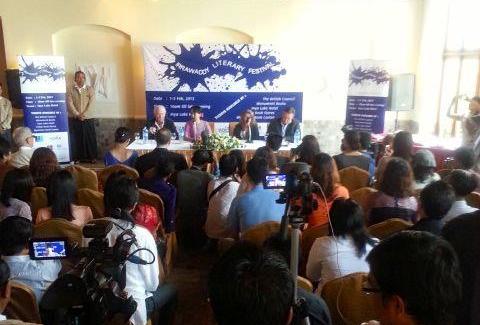International authors are reconsidering their attendance at the Irrawaddy Literature Festival in Mandalay next month in response to Myanmar’s displacement of Rohingya and the festival’s failure to address the crisis in Rakhine State.
Australian children’s author Gus Gordon said he will definitely not attend the festival, which was founded in 2013 to bring international exposure to Myanmar literature.
“It became increasingly evident that, aside from the potential safety risks, it was the wrong thing to do,” he told the South China Morning Post today. “It didn’t sit well with me that I was about to go to a literary festival and speak about stories when a humanitarian crisis was happening my doorstep.”
Myanmar military operations in response to attacks by the Arakan Rohingya Salvation Army have displaced over half a million Rohingya civilians from the country, prompting widespread accusations of ethnic cleansing.
Another invitee, Lonely Planet co-founder Tom Wheeler, says he has not been able to decide whether he will attend.
“I’m between a rock and a hard place,” he told SCMP. “If you go, you could be looked upon as ignoring the problem and trying to pretend things are normal when they are not. On the other hand, if you don’t go when you were going to go you are not confronting the problem.”
Both of the writers say part of their frustration comes from the festival organizers’ failure to make a statement about the crisis.
“They won’t stand up and say this is a terrible situation because Aung San Suu Kyi, who is patron of the festival, is guilty, guilty, guilty and should be saying more about it,” Wheeler said.
Festival founder Jane Heyn told SCMP: “The [festival] board has decided that it would be inappropriate for the ILF, a literary festival, to make public statements about the situation in Rakhine state. The festival is, of course, liaising with all participants individually, including discussing any concerns they may have about the situation in Rakhine state.”
For other authors, this has been sufficient.
Michael Vatikiotis, the Asia regional director of the Centre for Humanitarian Dialogue and author of the 2017 book Blood and Silk: Power and Conflict in Modern Southeast Asia, said he plans to attend the festival, which kicks off in early November.
“I generally don’t let anything get in the way of engagement in troubled places. Moreover, the festival is probably needed more than ever because in the current situation there’s a danger there will be no dialogue, only divisive rhetoric,” he said.
Wheeler said that if he does decide to attend, he will use the opportunity to raise the issue of the Rakhine crisis publicly.
“I’m not going to go there and say Lonely Planet has been good fun, they’ve got a nice new guide to Italy. I’m going to have to confront the situation there.”





Reader Interactions